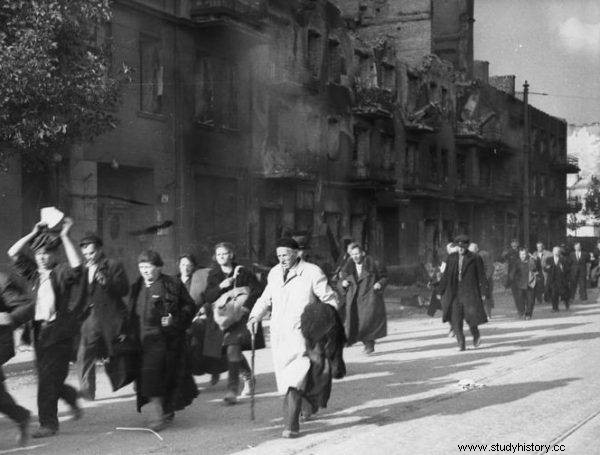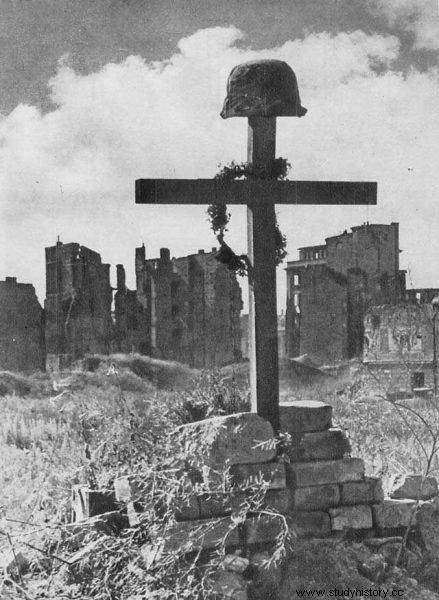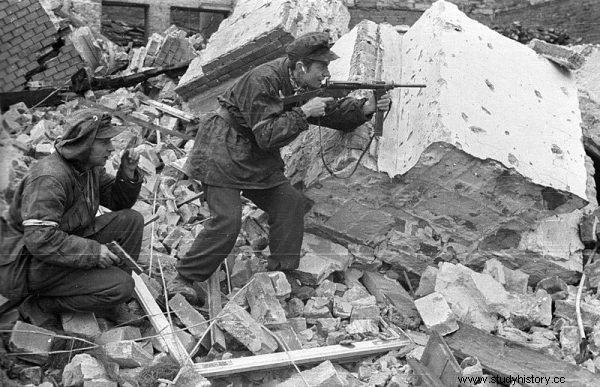The Warsaw Uprising killed 180–220,000 civilians, completely defenseless. Nobody has counted it exactly and will never count again. Losses among the insurgents are 18–20,000 killed. "Zośka", "Alek", "Rudy" and hundreds, thousands of others like them, although they could "die beautifully", they also wanted to live beautifully, and not only be stones thrown on the ramparts of their homeland.
The Home Army, which, according to some sources, numbered almost 400,000 soldiers - trained and organized in military formations - at least numerically the largest underground army in Europe, an army subordinated to the Polish government in exile.
Due to the state of armament, it could not take up an open fight such as in a regular war. Its chance was in guerrilla warfare and the original plan "The Tempest", formulated in 1943, made such an assumption . The military act was to lead to the liberation of the occupied areas just before the Red Army entered them. In order to avoid losses among the civilian population and not to expose the city - bombed in 1939 and partially burned out after the suppression of the ghetto uprising - to destruction on a much larger scale, Warsaw was excluded from the "Tempest" plan.
Historians still argue about when these assumptions were changed, but it is certain that at the beginning of July 1944, on the orders of General Tadeusz Komorowski "Bor", large amounts of weapons and ammunition were sent from Warsaw to the eastern districts of the Home Army, where an attempt was made to implement the "Tempest" plan. Sławomir Zawadzki writes:
In those days of euphoria (late July 1944), as I remember today, we, young boys, less than sixteen years old, wondered if the news about the fate of Home Army troops liberating Vilnius and Lviv, an uprising in Warsaw makes sense and will it break out.
"May we not be unprepared!"
Aleksander Kamiński quotes the order of the commander of the scout unit Mokotów Górny:“ We have little time. The great moment of regaining independence is drawing near. There will come a time when it will be shown whether we will cope with the obligations that will befall us. May we not be unprepared! ”. Significantly, there is no appeal to heroism and sacrifice, but to duty and preparation.
The heroes of the legend of the Gray Ranks, immortalized in the book by Aleksander Kamiński, the book that co-created this legend, never appeared to me as losers who did not value life, ready to die at any call. Kamiński describes the moment of preparations for the attempt to rescue "Rudy" from the hands of the Gestapo, the enormous determination of his colleagues preparing this action and the moment of the profession when "Zośka" finds out that it still needs to be postponed. He obeys because he trusts the command, he is a soldier.

The uprising in Warsaw was not reckoned with, nobody thought to expose the entire population of Warsaw to bomb attacks
In this moving book, the first and second editions of which were published before August 1, 1944, the slogan of the uprising already appears, but it appears there in a completely different context from the one in which it was implemented.
Rise ... When you let your imagination run wild - you can see fields and forests, marches and bivouacs, ambushes and chases. Zośka easily linked these images with the old, pre-war scout expeditions into forests and fields. (...) And again, as before the war, there were nights in the rustle of trees and tens of kilometers of well-worn dirt roads.
It is very romantic and completely unrealistic, however, it indicates that the uprising in Warsaw was not taken into account, it never occurred to anyone to expose the entire population of Warsaw to bomb attacks , artillery shot and the bestiality of Reinefarth's troops "cleansing" the city of the human element.
It is beautiful to die, to live more beautiful
So by doing low-sabotage tasks, young people graduated from school, and generally with good results. At the meetings, they also discussed social, ethical and economic issues. At the same time, they organized exercises that were to serve as a training for soldiers' service in the uprising.
The author of Kamieni na szaniec knew these young people like no other, so it is hard to believe that the outbreak of the uprising was inevitable. "Zośka", "Alek", "Rudy" and hundreds, thousands of others like them, although they could "die beautifully", they also wanted to live beautifully and not only be stones thrown on the ramparts of the motherland.

The text is an excerpt from Wojciech Brański's book "Jędrek '44", which has just been released by the Bellona publishing house.
Recently, I have disliked this very phrase by Słowacki, whom I generally appreciate very much. He was not a hero himself, but it was not his deeds, but his words that influenced the generation of Baczyński and other poets who died tragically in the uprising - those diamonds with which we shoot when aliens want to take our freedom.
However, we do not blame God for these living ramparts, because it is people, commanders, who give orders.
No weapons, no glory
Let me start, brother, with the most terrible things. 180,000–220,000 civilians died, completely defenseless. Nobody has counted it exactly and will never count again. More precise data are given for the insurgents, the number of which is estimated at 50,000 (but only one in ten was armed in such a way).
Own losses, in military language, amount to 18-20,000 killed (so almost as much as in Katyn) and 6,500 wounded. The cruel calculation gives the following proportions: death of ten civilians, including children, the elderly, the sick and the disabled, per one killed insurgent, that is 10:1 .
These accounts are even worse when you compare the number of Poles and Germans killed:for one killed German on the altar of the homeland, we sacrificed one hundred and twenty Poles. Every day of the uprising, 3,000 of our brothers, sisters, fathers, mothers, grandfathers and grandmothers died - three thousand Poles, every day one, statistically speaking, large village disappeared from our land.
Civilians who did not take the military oath, rather did not die on the ramparts, but in the end, many more died than the insurgents - soldiers of this 63-day battle. Not only because there were many more of them. They died en masse due to bombing and shelling with "cows" from which there was no shelter; bombs and heavy missiles penetrated into the basements. It is known that the insurgents preferred to stay in close proximity to the German lines, because there were no bombs falling.
Inevitable victims of the Uprising?
The extent of suffering and the enormity of the losses of the civilian population barely reached the general consciousness. But did the command take them into account? And if it didn't, you must clench your fist, brother, because the purpose of this battle was to free not the dead, but the living.
You say, "There are casualties in every war, that's inevitable." "Yes, it is true," I will answer, "but it is about the extent of this tragedy."
On various occasions, the fallen is called together. It lists the name, surname and military rank in turn; a company of honor exclaims, "Fallen in the field of glory," or something similar. The uprising lasted 63 days So, if on any anniversary, a daily roll-call of fallen civilians and insurgents was held, assuming that on average over 3,000 of them died daily, then calling only names, surnames, affiliation to a unit and lived years would take 5 to 8 hours for 63 days .

The extent of suffering and the enormity of the loss of the civilian population hardly became known to the general public.
You say I'm abusing arithmetic, juggling numbers. This is not so. I would like to reach out to those unimaginative who are not overwhelmed by the sheer size of the drama expressed in numbers. Perhaps this image will appeal to them:it is 100 kilometers from Warsaw to Radom. Imagine driving this road - it's almost a highway now - and along it lie the unbroken delay of those who did not survive the uprising, 200,000! On each meter of the road, two human bodies, children, boys and girls, women and men…
So can you remain indifferent when you think about those thousands, those many nameless, buried without coffins in hastily dug pits, under pavements, in the ruins of a city that is still torn down and on fire?
With bare hands on the enemy armed to the teeth
In many statements about the genesis of the uprising one hears the argument that it must have broken out, because such were the expectations of the people and masses of the Home Army. Then why didn't it break out on July 29, 30 or 31 that is, on the days following the "W" hour preparatory alert ordered by Colonel "Monter", then canceled by "Bora"? After all, most of the Home Army units were grouped in those days and the mood of full mobilization to fight, as it turned out, was greater than on the second date.
The soldiers of a dozen or so platoons, having received no weapons despite promises, then told their commanders that with their bare hands would not go to the enemy armed to the teeth (...). Many squad platoons were disorganized back then - Stanisław Podlewski defends here the common sense of the uprising generation of Poles, whom many treat as doomes who do not value life.
Are people making such statements, even for a moment, able to imagine a spontaneous outbreak of the uprising uncontrolled by the command? Uprisings, not rebellions or riots. And with the participation of inexperienced, untrained, poorly or not at all armed, what can I say, amateurs in the soldier profession?

In many statements about the genesis of the uprising one hears the argument that it must have broken out, because these were the expectations of the people and masses of the Home Army.
Perhaps it would even be more advantageous as a last resort, because such a rebellion would be suppressed very quickly and it would be possible without this terrible sacrifice of the city and its inhabitants. This is not an unfounded hypothesis - on the right bank of Prague on August 1, an uprising broke out as well, and it was extinguished after a few days. Prague survived, the German repressions were not excessive, the historian of the uprising, Adam Borkiewicz, and the commander of the Praga district, Lieutenant Colonel Antoni Żurowski "Bober", do not mention them.
There are opinions praising this liberation spurt of Poles, because despite the huge German advantage, the insurgents were ill-armed and inexperienced in the heat of the fighting for 63 days. Well, the pragmatist will say (maybe just you, brother), but if the uprising had ended earlier, the moral effect would have been the same, and the casualties and destruction would have been less. To boast that the uprising lasted 63 days is unworthy for me, because it was not about an entry in the book of records.
According to Jerzy Kirchmajer, the most convenient moment for the outbreak of the uprising and taking over the city was the several days of panic revealed by the Germans on July 22/23. Many older Varsovians must have remembered the disarming of the Germans by middle school students in November 1918, and in those few days of July 1944 it could have seemed that the situation would be similar. And yet, in July, there were no such attempts at spontaneous action by the population, not to mention the soldiers of the Home Army. Anyway, it would be very naive to see the similarities between the two historical moments.
Source:
The text is an excerpt from Wojciech Brański's book "Jędrek '44", which has just been released by the Bellona publishing house.
